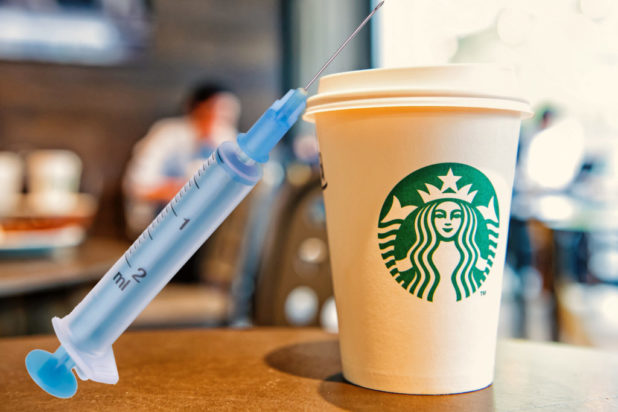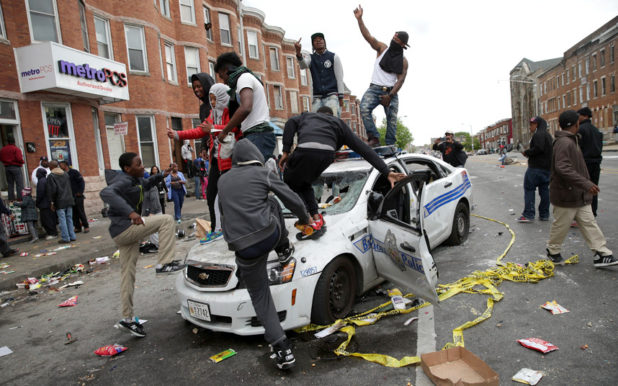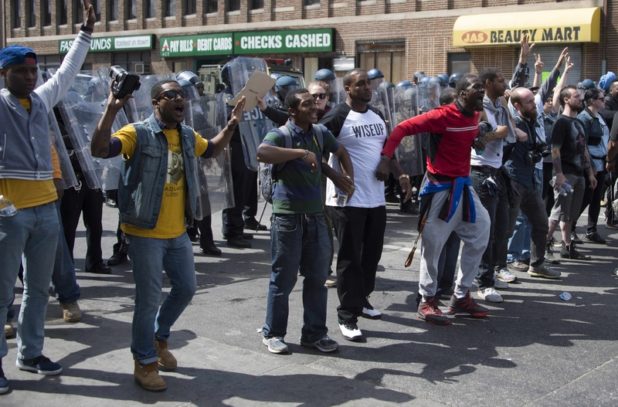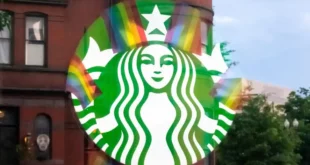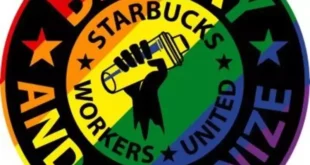Pomidor Quixote
Daily Stormer
April 23, 2019
Starbucks recently made the decision to transition from a chain of coffee shops to a chain of homeless shelters, following an incident where black people were hanging out there waiting to do a drug deal and refused to buy anything and were asked to leave by the staff.
When you don’t discriminate who can or can’t enter your territory, you risk getting enriched by all sorts of lowlifes in all sorts of ways.
This applies both to bathrooms and countries.
Starbucks is adapting to its new enriching experience, because — you know, part and parcel.
Starbucks’ efforts to address opioid use and improperly disposed needles in its bathrooms are expanding.
Starbucks stores in at least 25 US markets have installed needle-disposal boxes in bathrooms in recent months. By this summer, the chain aims to have installed sharps boxes in bathrooms in all regions where such action has been deemed necessary.
The coffee giant also allows local district managers or store managers to put in requests to have sharps-disposal boxes installed in their locations’ bathrooms.
…
Starbucks has been testing solutions in recent months as workers’ safety concerns have mounted, with thousands of employees signing a petition calling for Starbucks to place needle-disposal boxes in high-risk bathrooms.
The company also faced at least one government investigation related to the issue in 2018 after two employees in a Eugene, Oregon, location were stuck with hypodermic needles within a month of each other, according to Occupational Safety and Health Administration (OSHA) documents obtained by Business Insider through a Freedom of Information Act request.
…
According to the Seattle Starbucks worker and other employees at the coffee giant who have worked in urban locations, encountering syringes on the job is often a fact of life.
“They generally appear in bathrooms, either wrapped up in paper towels or lurking at the surface of the garbage,” the Seattle employee said. “We are responsible for removing them from public spaces and placing them in a sharps-disposal kit, always with gloves if not with tongs. Less often, they are poking out of the bottom of the bag when changing.”
While messy bathrooms and drug use can create an uncomfortable work environment, most employees’ top fear is an accidental needle prick. Being stuck by a hypodermic needle means risking exposure to HIV and hepatitis, and it requires workers to immediately visit a hospital or urgent-care unit for testing and treatment.
“It is a scary situation to see because we don’t have needle-proof gloves and the only protection we have against any sharp objects is ‘double bagging’ a trash can with two bags instead of one, which is a ridiculous thing to actually think two plastic bags can stop a sharp needle,” said a Nashville, Tennessee, Starbucks employee who has worked at the chain for more than a decade.
…
In October 2018, the Oregon OSHA opened an investigation into a Eugene, Oregon, Starbucks location after an employee filed a complaint with the administration. Two employees had recently been stuck by hypodermic needles at the store, the OSHA investigation confirmed.
…
In October, three Starbucks employees in Seattle told local news outlets that they encountered hypodermic needles on the job nearly every day. They said they had to take antiviral medications to protect themselves from HIV and hepatitis.
…
In January, Business Insider reported that the chain was also testing using heavier-duty trash bags to prevent needle pokes and removing trash cans from certain bathrooms. Social-media reports said that some locations in Philadelphia have put blue lightbulbs in their bathrooms in an effort to make it more difficult for people to find veins to inject drugs.
Would you go drink coffee at a place that has used needles in their trash cans though? What if you trip and fall over some needle or whatever? The fact that used needles are even present there is already a risk.
Are baristas medical professionals? Because in order to dispose of medical waste in a hospital, you have to have a degree. There is an entire procedure.
There’s also the awkwardness of entering the store bathroom and finding a stinky nigger tripping while playing with needles. What would customers even do in that situation?
How long until customers stop using the homeless-shelter bathrooms altogether?
Starbucks customers are mostly pro-diversity, anti-racism soy-fans, but even their tolerance has a limit.
By allowing the homeless and all kinds of drug addicts to use their bathrooms, Starbucks is not only disrespecting customers but also putting them at risk.
Entering a Starbucks means being exposed to all kinds of bad hombres and bad needles.
I guess this means they’ll have to up the soy use to further neuter their customers.
What happens with Starbucks and needles is a micro-portrait of what happens with our civilization at large.
Our people invited primitive savages thinking those could be removed from the jungle but instead the primitive savages brought the jungle with them, and now the jungle is everywhere — even in Starbucks’ bathrooms.
 Daily Stormer The Most Censored Publication in History
Daily Stormer The Most Censored Publication in History
